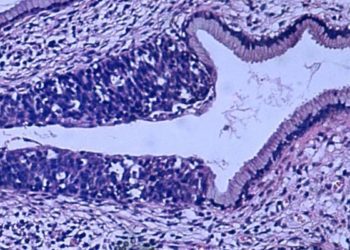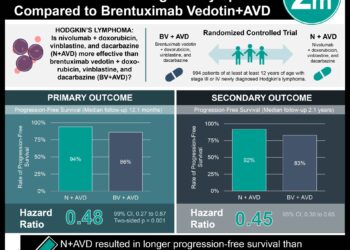#VisualAbstract: Assessment of Combined Nivolumab and Bevacizumab in Relapsed Ovarian Cancer
1. Nivolumab and bevacizumab combination therapy appears to be efficacious in relapsed epithelial ovarian cancer, especially in patients with platinum-sensitive disease.
Evidence Rating Level: 2 (Good)
Although previous investigations have indicated that the immune system plays an important role in ovarian cancer control, results from trials thus far on single-agent immune checkpoint inhibition have demonstrated limited clinical activity. Thus, it has been hypothesized that immune checkpoint inhibition could be potentiated by the addition of an agent that targets a separate pathway, such as bevacizumab, a VEGF-A inhibitor. In this phase II, single-arm study, 38 women with relapsed epithelial ovarian cancer (defined as disease recurrence within 12 months of their last platinum-based therapy) received intravenous nivolumab and intravenous bevacizumab once every 2 weeks to assess objective response rate (ORR) as measured by Response Evaluation Criteria for Solid Tumors (RECIST) 1.1. Secondary end points included evaluation of the ORR by platinum sensitivity, assessment of progression-free survival (PFS), investigation of the association of tumor PD-L1 with response to therapy, and safety. At baseline, 18 patients had platinum-resistant and 20 had platinum-sensitive disease, and the mean (SD) age was 63.0 (9.1) years. Researchers found that 11 patients responded to bevacizumab and nivolumab (ORR 28.9%, 95% CI 15.4% to 45.9%), 8 of which were patients with platinum-sensitive disease (ORR 40.0%, 95% CI 19.1% to 64.0%), and 3 of which were patients with platinum-resistant disease (ORR 16.7%, 95% CI 3.6% to 41.4%). Median progression-free survival (PFS) was 9.4 months (95% CI 6.7 months to NA), with a median PFS of 12.1 months (95% CI 8.4 months to NA) in platinum-sensitive patients and 7.7 months (95% CI 4.7 months to NA) in platinum-resistant patients. There were 10 confirmed or unconfirmed responses in patients with a PD-L1 tumor percentage lower than 1 (ORR 45.5%) and 2 in patients with a PD-L1 tumor percentage of 1 or more (ORR 14.3%). Adverse events were common; 34 participants (89.5%) experienced at least one treatment-related adverse event, and 9 participants (23.7%) experienced a grade 3 or higher treatment-related adverse event. This study was limited by the lack of a comparator arm and the small sample size. In summary, this study suggests that the combination of nivolumab and bevacizumab is efficacious in relapsed epithelial ovarian cancer, with greater activity in the platinum-sensitive setting. The results also reinforce the notion that PD-L1 expression may not be a reliable biomarker of response to immunotherapy in this disease.
Click to read the study in JAMA
©2019 2 Minute Medicine, Inc. All rights reserved. No works may be reproduced without expressed written consent from 2 Minute Medicine, Inc. Inquire about licensing here. No article should be construed as medical advice and is not intended as such by the authors or by 2 Minute Medicine, Inc.







